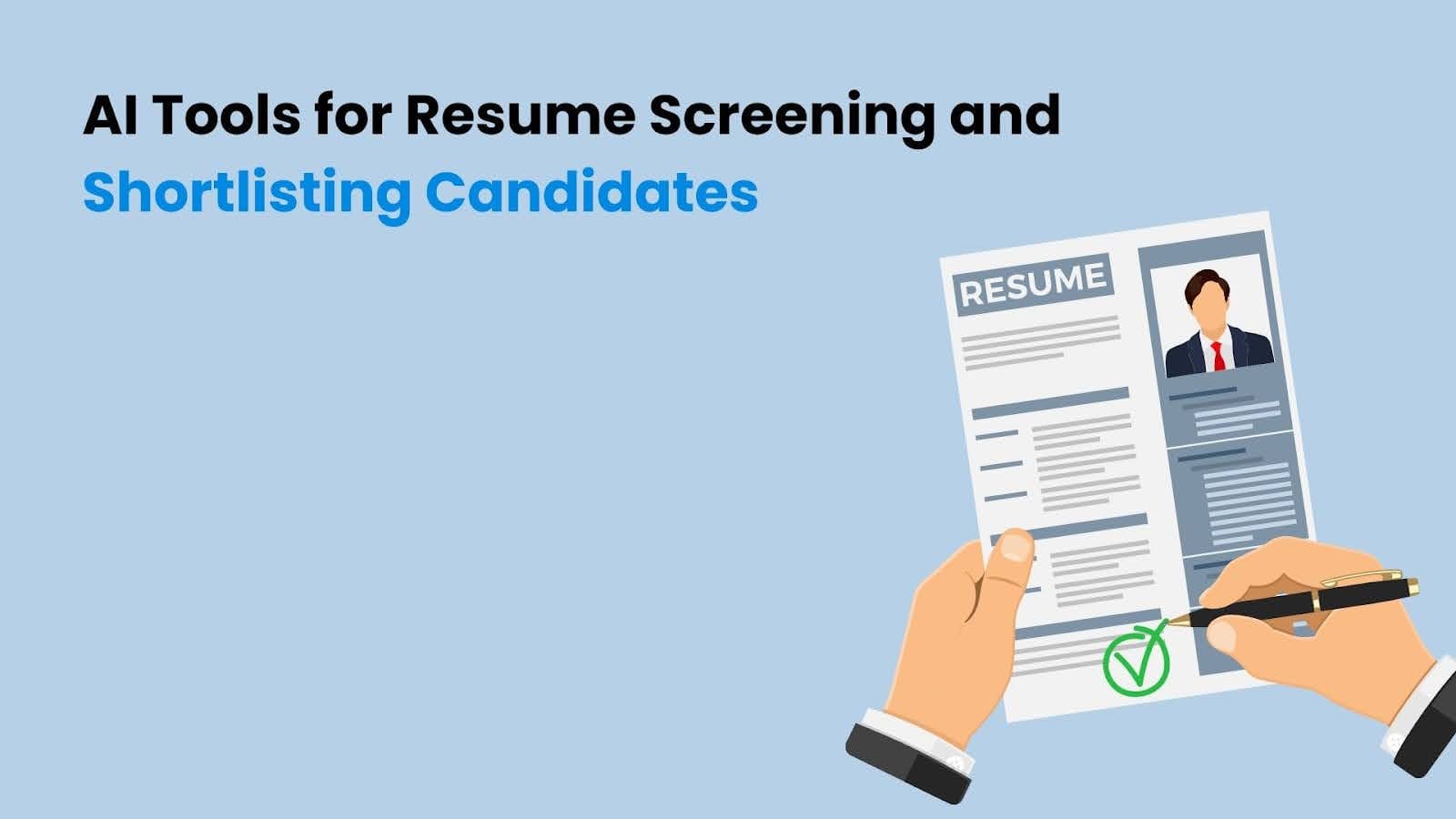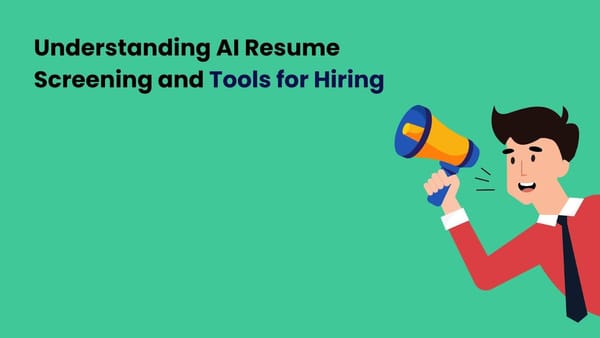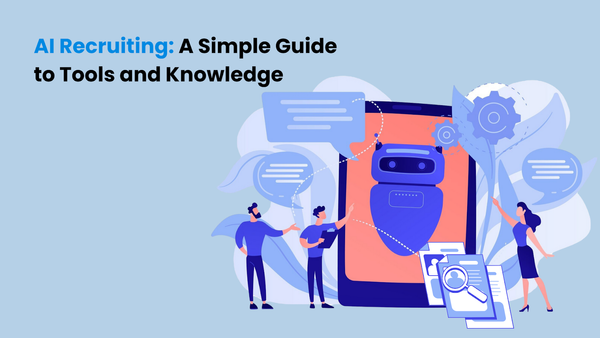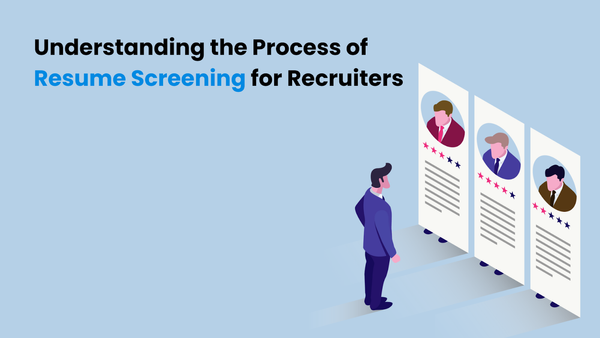Recruiters today face an overwhelming challenge: sifting through hundreds—sometimes thousands—of resumes to find the perfect hire. It’s a time-consuming, error-prone process that often leaves hiring teams frustrated and stretched thin. Add to that the pressure to make fast, accurate decisions, and it’s no wonder so many organizations are turning to smarter solutions.
That’s where resume shortlisting software comes in. By automating repetitive tasks and improving accuracy, AI tools are revolutionizing how businesses screen and shortlist candidates. From small startups to large enterprises, these tools are helping companies save time, reduce hiring biases, and focus on what truly matters—building great teams.
Ready to discover the top tools transforming recruitment in 2025? Let’s dive in.
First, let us cover the basics and understand how resume screening software is reshaping hiring efficiency.
What is Resume Screening Software?
Resume screening software is a tool designed to simplify the recruitment process by automating how resumes are evaluated and shortlisted. Instead of manually reviewing each application, recruiters can rely on these tools to identify qualified candidates faster and with greater accuracy. By leveraging artificial intelligence, these tools analyze resumes for relevant skills, experience, and qualifications, ensuring only the best matches make it to the next stage.
For instance, suppose a growing tech company in the UAE is hiring for multiple roles. With hundreds of resumes pouring in, the HR team faces the daunting task of sorting through each one. A resume screening software not only narrows the list to the most suitable candidates but also provides insights into why they’re a match. This allows the team to focus on engaging top talent instead of getting bogged down by paperwork.
The growing demand for such tools is no surprise. The recruitment software market, valued at USD 7.19 billion in 2024, is projected to reach USD 7.84 billion in 2025 and is expected to grow to a staggering USD 17.15 billion by 2034. With a CAGR of 9.82%, the market’s expansion highlights how businesses are increasingly relying on smart, AI-driven solutions to optimize hiring.
Now that we’ve covered the fundamentals, let’s explore the top AI tools that are leading the way in 2025.
Top 10 AI Tools for Resume Screening in 2025
Below, we’ve compiled a list of the top 10 AI tools for resume screening that are not only transforming recruitment processes but also setting new benchmarks for efficiency, accuracy, and engagement. From hyper-personalized outreach to seamless integrations, these tools are redefining how we hire in the modern age. Let’s explore each one of them in detail.
- TidyHire: AI-Powered Recruitment Made Simple
TidyHire is an innovative AI-driven platform designed to transform how businesses approach recruitment. From streamlining resume screening to automating candidate engagement, TidyHire offers a comprehensive suite of tools that cater to both inbound and outbound recruiting needs. Its intuitive design and powerful features make it a go-to choice for companies of all sizes, including SMEs and large enterprises.
Key Features:
- Recruiting Intelligence Agent (RIA): TidyHire’s RIA provides access to over 700 million profiles from 30+ sources, ensuring a vast and diverse talent pool. The system doesn’t just locate candidates; it verifies contact details and matches them to your hiring needs, saving recruiters hours of manual effort.
- Generative AI for Outreach: Engaging passive candidates is no longer a challenge. TidyHire uses AI-generated, hyper-personalized messaging to connect with candidates across platforms like LinkedIn, email, SMS, and WhatsApp. This targeted approach improves response rates and builds trust.
- Seamless Integrations: TidyHire works effortlessly with tools like Slack, Microsoft Teams, and ATS platforms, ensuring your recruitment team stays organized and collaborative. These integrations simplify workflows and eliminate the need to switch between systems.
- Chrome Extension: The TidyHire Chrome Extension makes candidate sourcing even easier by allowing recruiters to directly collect profiles and verified contact information from professional networking sites like LinkedIn. It’s fast, efficient, and integrates seamlessly into your recruitment process.
- Analytics and Reporting: TidyHire provides real-time insights into recruitment campaigns, from tracking response rates to identifying the most effective outreach strategies, the platform’s analytics help you optimize your hiring approach continuously.
- Xceptional Recruiters: For businesses with unique or high-volume hiring needs, TidyHire offers access to top-tier hiring experts who collaborate with RIA. This combination ensures culture-aligned, efficient, high-quality recruitment for even the toughest roles.
Pros:
- Saves time by automating repetitive tasks.
- Access to a vast talent pool of over 700 million profiles.
- Hyper-personalized communication improves candidate response rates.
- Scalable for both SMEs and large enterprises.
- Real-time analytics refine hiring strategies.
Cons:
- May require some training for first-time users.
- Premium features like Xceptional Recruiters may cost more but deliver high ROI.
- Qureos: AI-Powered Precision for Recruitment
Qureos is a robust recruitment platform designed to streamline resume screening with AI-driven precision. It’s a favorite among businesses in the GCC, offering tools that align perfectly with the fast-paced hiring demands of the UAE.
Key Features:
- AI-Powered Matching: Qureos matches candidate profiles to job requirements with high accuracy, ensuring only qualified candidates are shortlisted.
- Automated Video Interviews: The platform offers video interviewing capabilities, allowing recruiters to assess skills and cultural fit seamlessly.
- Multi-Platform Job Posting: Qureos broadens talent outreach by automating job postings across various platforms.
- Data-Driven Insights: Recruitment teams can leverage advanced analytics, including data on candidate demographics and skillsets, to make informed decisions.
Pros:
- High precision in matching candidates to roles.
- Integrated video interviewing for deeper candidate assessment.
- Useful demographic insights for targeted hiring.
Cons:
- Limited customization in outreach messaging.
- Best suited for medium to large businesses, less tailored for SMEs.
- HireVue: Modern Recruitment Simplified
HireVue focuses on modernizing recruitment with video interviewing and AI-driven assessments. It’s a versatile tool used widely across industries for its ability to speed up the hiring process.
Key Features:
- Video Interviewing: HireVue’s core feature allows candidates to record responses, enabling recruiters to review interviews at their convenience.
- Predictive Analytics: AI-driven assessments analyze candidate interviews to predict future performance and fit.
- Customizable Questionnaires: Recruiters can create tailored interview scripts to evaluate specific skills.
- Global Reach: Multi-language support and compliance with international hiring standards.
Pros:
- Saves time with asynchronous video interviews.
- Predictive analytics improve hiring decisions.
- Strong focus on candidate experience.
Cons:
- Higher cost for advanced analytics features.
- Relies heavily on video interviews, which may not suit all roles.
- Manatal: Simplifying Recruitment Workflows
Manatal is a user-friendly AI recruitment tool designed to streamline hiring workflows and improve collaboration. It’s ideal for teams looking to manage everything in one place.
Key Features:
- AI Resume Screening: Advanced matching algorithms ensure the most suitable candidates are shortlisted.
- Customizable Pipelines: Allows recruiters to tailor workflows to specific hiring needs.
- Collaboration Tools: Real-time teamwork features improve communication across recruitment teams.
- Data Migration: Easily imports candidate data from other systems.
Pros:
- Intuitive interface with customizable workflows.
- Real-time collaboration tools.
- Affordable pricing for small and medium businesses.
Cons:
- Limited advanced analytics features.
- Best suited for smaller hiring teams with less complex needs.
- Eightfold AI: Talent Intelligence for Smarter Hiring
Eightfold AI leverages advanced predictive analytics to enhance recruitment outcomes. Its AI-powered platform is designed to help businesses identify not just the best candidates, but those with the potential to grow within their roles.
Key Features:
- Predictive Talent Matching: Maps candidate skills to job requirements and future roles within the company.
- Skill-Based Search: Highlights transferable skills, making it easier to identify non-traditional candidates.
- Diversity & Inclusion Tools: Promotes unbiased hiring by analyzing and mitigating potential biases.
- Talent Retention Insights: Offers insights on how to nurture and retain top talent.
Pros:
- Predictive matching improves long-term hiring success.
- Strong focus on diversity and inclusion.
- Useful retention and growth insights.
Cons:
- High initial setup effort.
- Requires comprehensive data to maximize effectiveness.
- PestoAI: Hiring Remote Developers with Ease
PestoAI focuses on helping businesses source and shortlist remote developers efficiently. Its AI algorithms ensure only top candidates make it through, simplifying the hiring process for remote technical roles.
Key Features:
- AI-Driven Screening: Advanced algorithms evaluate resumes for key skills, experience, and remote readiness.
- Candidate Database: Offers access to a vetted pool of remote developers.
- Customizable Criteria: Allows businesses to tailor screening parameters to fit specific project needs.
- Time Zone Matching: Helps align candidates’ availability with project requirements.
Pros:
- Streamlines remote developer hiring.
- Saves time by pre-vetting candidates.
- Customizable criteria for targeted searches.
Cons:
- Limited scope for non-technical roles.
- Less suited for in-office hiring needs.
- Skima AI: Precision Screening at Scale
Skima AI specializes in large-scale resume screening with a focus on precision. It’s known for its exceptional accuracy, ensuring that only the most relevant candidates make the cut.
Key Features:
- Resume Parsing: Quickly extracts and organizes candidate information.
- Skill-Based Matching: Accurately matches resumes to job descriptions.
- Scalable Screening: Handles high volumes of applications efficiently.
- Simple Integration: Easily integrates with existing ATS platforms.
Pros:
- Extremely accurate resume screening.
- Scales well for high-volume hiring.
- Easy to integrate with current systems.
Cons:
- May require additional tools for candidate engagement.
- Limited reporting features.
- Emirates HR: AI for Regional Recruitment Needs
Emirates HR is tailored to meet the recruitment challenges faced by businesses in the UAE and the broader GCC region. It provides AI-driven tools that simplify resume screening and ensure better candidate matches.
Key Features:
- Localized Screening Tools: Customized to align with regional hiring practices.
- AI-Powered Shortlisting: Quickly identifies top candidates based on predefined criteria.
- HR Management Integration: Combines recruitment workflows with HR processes.
- Actionable Insights: Offers reports to refine recruitment strategies.
Pros:
- Optimized for UAE and GCC markets.
- Efficient shortlisting improves time-to-hire.
- Integrates well with internal HR systems.
Cons:
- Less customizable than global platforms.
- Advanced analytics may require additional modules.
- EasyHR: Streamlined Recruiting for Growing Businesses
EasyHR simplifies recruitment processes with AI features that make resume screening faster and more accurate. It’s a solid choice for businesses looking for a straightforward, efficient solution.
Key Features:
- AI-Enhanced Resume Screening: Automates the evaluation process, ensuring quality shortlists.
- Payroll Integration: Offers built-in features to manage candidate onboarding and payroll setup.
- Simple Interface: User-friendly design makes it easy for recruiters to navigate.
- Scalability: Scales well as businesses grow, handling increasing hiring volumes with ease.
Pros:
- Easy to implement and use.
- Great for fast-growing businesses.
- Integrates recruitment with payroll and HR workflows.
Cons:
- Limited advanced reporting options.
- Some features require add-ons for full functionality.
- Zimyo Recruit: Comprehensive AI-Driven Recruitment
Zimyo Recruit delivers a well-rounded set of features for resume screening and shortlisting. It’s designed to help businesses find top talent efficiently while maintaining a strong focus on candidate experience.
Key Features:
- AI Resume Parsing: Quickly extracts relevant data from resumes to identify qualified candidates.
- Candidate Tracking System (ATS): Streamlines applicant tracking and shortlisting.
- Integration Capabilities: Connects with job boards and social media platforms to expand reach.
- Interview Scheduling Tools: Simplifies the coordination of candidate interviews.
Pros:
- Comprehensive features for candidate management.
- Strong integration with popular job boards.
- Enhances candidate engagement through easy scheduling.
Cons:
- Onboarding might require some guidance.
- Advanced analytics may not be as robust as dedicated BI tools.
Are you looking for the top head hunting agencies in the UAE? Here’s the list of the most trusted ones!
Before making your choice, let’s outline the key criteria that will help you select the right software for your needs.
Selection Criteria for Resume Screening Software in 2025
With so many options available, narrowing down the choices can be overwhelming. However, considering key selection criteria will help ensure you pick a tool that enhances efficiency, streamlines hiring, and delivers results. Below are the essential factors to evaluate when selecting resume shortlisting software for your recruitment process.
- Accuracy and Relevance of Resume Parsing
Accuracy is non-negotiable when it comes to resume parsing. The software should be able to accurately extract key information such as candidate qualifications, skills, experience, and contact details from resumes without any errors. For instance, a resume screening tool like TidyHire excels in this area by leveraging advanced AI algorithms that ensure high parsing accuracy, even when candidates use unique formatting or non-standard layouts.
Why it matters: A tool that misreads or fails to capture key data leads to false positives or missed opportunities. This can result in inefficient shortlisting and wasted time for recruiters.
- AI-Powered Matching for Skills and Experience
Resume shortlisting software must go beyond simply scanning resumes. It should utilize AI to match candidates’ skills and experience to job requirements. Tools like TidyHire and Eightfold AI take this further by applying machine learning to continuously improve the matching process. This means that the more data the system receives, the better it becomes at predicting top talent.
Why it matters: AI-driven matching ensures that recruiters review the most relevant candidates based on the job role and company culture, ultimately improving hire quality.
- Customization and Flexibility
Recruitment needs vary across industries, roles, and company cultures. Therefore, the ability to customize the resume screening process is essential. A good resume shortlisting software should allow users to set filters for specific skills, experiences, or qualifications tailored to their hiring goals.
Why it matters: Customization ensures that the screening process is adaptable to each position's unique requirements. For example, Skima AI allows recruiters to set custom parameters, ensuring that only the most relevant candidates advance to the next stage.
- Scalability to Meet Growing Demands
As your company grows, so does the volume of resumes and candidates. Whether you’re hiring for a few roles or scaling up rapidly, your resume screening software should be able to handle high volumes without a hitch. EasyHR and Zimyo Recruit are great examples of platforms that excel in scalability and accommodate businesses of all sizes.
Why it matters: Scalability means that the software will continue to perform efficiently even as your hiring volume increases, saving recruiters time and resources in the long run.
- Integration with Existing Recruitment Tools
A seamless integration process with your existing recruitment tools, such as Applicant Tracking Systems (ATS), HRIS, or communication platforms (Slack, Microsoft Teams), is essential. TidyHire offers robust integration with several ATS and HR platforms, ensuring that recruiters can use their preferred tools alongside the resume screening software.
Why it matters: Integrations reduce the need for switching between platforms, which can cause inefficiency and errors. A well-integrated tool allows for smooth, end-to-end recruitment workflows.
- Candidate Experience and Engagement Features
The recruitment process isn't just about screening resumes – it's also about engaging candidates throughout. Choose software that helps you build a strong relationship with candidates, even in the early stages. Features like AI-driven personalized outreach, automated follow-ups, and candidate status updates are vital in keeping candidates engaged.
Why it matters: An engaging candidate experience leads to higher response rates, better employer branding, and a smoother hiring process. Tools like TidyHire’s hyper-personalized messaging improve candidate engagement by delivering tailored communication that resonates.
- Reporting and Analytics Capabilities
Data-driven insights are key to optimizing your recruitment strategy. The software should offer real-time analytics on the effectiveness of your screening process, such as response rates, time-to-hire, and candidate quality metrics. TidyHire’s real-time analytics and reporting dashboard allow recruiters to continuously improve their strategies and ensure they’re attracting the best candidates.
Why it matters: The ability to track metrics helps recruiters make informed decisions, adjust strategies, and refine the hiring process to meet evolving needs.
- Cost-Effectiveness and ROI
While the features of resume screening software are critical, so is its cost. Consider the software's pricing model and weigh it against the benefits it provides. Some tools might have premium features that justify higher costs, while others offer great functionality at a more affordable rate. TidyHire, for instance, offers flexible pricing plans that cater to both small businesses and large enterprises, ensuring that companies of all sizes can access high-quality AI tools at a reasonable price.
Why it matters: A cost-effective solution should bring enough value to justify the expense. By evaluating ROI through improved efficiency and better hires, you ensure that the software is a worthwhile investment.
- User-Friendliness and Support
Ease of use is another essential factor. Complex or cumbersome interfaces can frustrate recruiters and lead to inefficiencies. The software should be intuitive and easy to navigate. Look for tools that offer strong customer support options, including tutorials, FAQs, and a responsive support team.
Why it matters: A user-friendly system minimizes the learning curve and helps your team quickly get the most out of the software. Reliable support ensures that any issues can be addressed promptly.
Now that you know what to look for, let’s explore how AI-driven recruitment tools are delivering tangible benefits for businesses.
Key Benefits of Using AI in Recruitment
AI is revolutionizing recruitment by simplifying tasks, improving hiring decisions, and enhancing the overall candidate experience. By automating repetitive processes and delivering actionable insights, AI makes recruitment faster, smarter, and more effective.
- Faster and More Accurate Resume Screening
Manually screening resumes is time-consuming and often leads to missed opportunities. AI-powered resume screening tools, like TidyHire, streamline this process by instantly analyzing resumes and identifying the most relevant candidates. Instead of spending hours or days filtering through stacks of applications, AI tools quickly sort through resumes, highlighting the best matches based on skills, experience, and qualifications. This results in a faster hiring cycle, allowing recruiters to focus on building relationships with top candidates.
- Enhanced Candidate Engagement through Automation
Staying in touch with candidates at every stage of the hiring process can be challenging, especially when juggling numerous applicants. AI solves this by automating personalized outreach, ensuring every candidate receives tailored messages. Whether it’s an initial introduction or a timely follow-up, AI tools like TidyHire send personalized communications across platforms such as LinkedIn, email, SMS, and WhatsApp. This saves time and helps build stronger connections with candidates, improving engagement and response rates.
- Better Decision-Making with Analytics and Insights
AI doesn’t just automate tasks—it helps recruiters make smarter decisions. With built-in analytics, AI tools provide valuable insights that guide hiring decisions. TidyHire, for example, offers real-time data on response rates, outreach success, and candidate engagement, enabling recruiters to refine their strategies. By using data to measure candidate fit, recruiters can make more informed, objective decisions, ultimately improving the quality of hires.
- Improved Candidate Experience with Streamlined Communication
A positive candidate experience is critical to attracting top talent. AI enhances communication by offering timely, automated updates throughout the hiring process. Instead of candidates waiting for days to hear back, AI-driven systems ensure they receive immediate feedback, interview scheduling, and status updates. With tools like TidyHire, communication is seamless, ensuring candidates feel valued and informed at every stage, from application to offer.
Searching for the top candidate tracking software? Read this blog to get all the details!
Conclusion
Resume screening doesn’t have to be a bottleneck in your hiring process. With tools like TidyHire, you can cut down the time spent on repetitive tasks and focus on what really matters—finding the right candidates. Whether it’s faster screening, better engagement, or real-time insights, AI gives you the edge you need to hire smarter.
Looking to streamline your hiring in 2025? Book a demo and see how easy it can be to find your next great hire.
FAQs
1. How does AI-based resume screening improve the hiring process?
AI-based resume screening tools, like TidyHire, automate the time-consuming task of reviewing resumes. They analyze resumes in seconds, ensuring only the most qualified candidates make it to the next stage, saving recruiters hours of manual effort.
2. What are the key benefits of using resume shortlisting software in recruitment?
Resume shortlisting software enhances efficiency by automating resume screening, improving candidate engagement with personalized communication, and providing data-driven insights to make better hiring decisions.
3. How does TidyHire’s AI-driven platform differ from other resume screening tools?
Unlike basic tools, TidyHire combines advanced AI with access to over 700 million profiles. It not only screens resumes but also automates outreach with hyper-personalized messages, ensuring effective candidate engagement at scale.
4. Can AI tools replace human recruiters in the hiring process?
While AI tools like TidyHire greatly enhance efficiency, they don’t replace human recruiters. Instead, they handle repetitive tasks like screening and outreach, freeing up recruiters to focus on strategic decision-making and building relationships.
5. What makes TidyHire the best resume screening software in 2025?
TidyHire stands out due to its advanced AI capabilities, vast talent pool, seamless integrations, and hyper-personalized outreach. It’s a comprehensive solution that speeds up recruitment while improving candidate engagement, making it ideal for businesses of all sizes.






